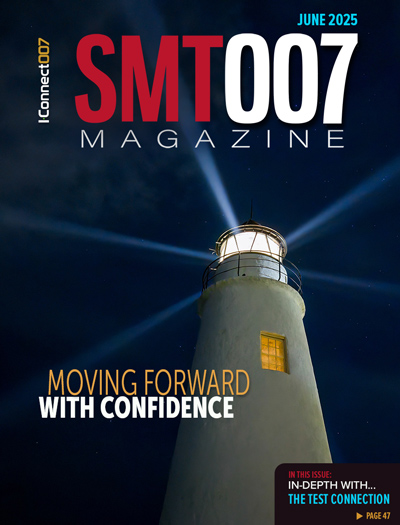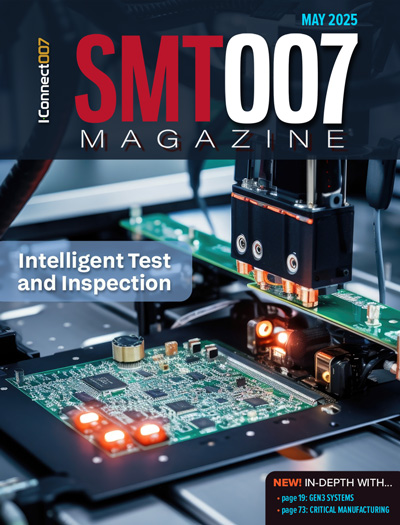-

- News
- Books
Featured Books
- smt007 Magazine
Latest Issues
Current Issue
What's Your Sweet Spot?
Are you in a niche that’s growing or shrinking? Is it time to reassess and refocus? We spotlight companies thriving by redefining or reinforcing their niche. What are their insights?

Moving Forward With Confidence
In this issue, we focus on sales and quoting, workforce training, new IPC leadership in the U.S. and Canada, the effects of tariffs, CFX standards, and much more—all designed to provide perspective as you move through the cloud bank of today's shifting economic market.

Intelligent Test and Inspection
Are you ready to explore the cutting-edge advancements shaping the electronics manufacturing industry? The May 2025 issue of SMT007 Magazine is packed with insights, innovations, and expert perspectives that you won’t want to miss.
- Articles
- Columns
- Links
- Media kit
||| MENU - smt007 Magazine
IPC Working to Revive Lead-Free R&D in High-Reliability Sectors
April 10, 2019 | Chris Mitchell, IPC VP, Global Government RelationsEstimated reading time: 3 minutes
Ask yourself the following question: Why is it that the aerospace, defense and high performance (ADHP) electronics sectors remain reliant on lead solders and components even as the commercial sector has largely phased out their use?
The short answer is that lead-free electronics do not offer the performance and reliability assurances that the ADHP sectors require, but the longer answer is that key stakeholders, including government entities, have not invested in the science to understand how to achieve symmetry and interchangeability between lead and lead-free electronics.
IPC is working to change that and we need your help.
Essential R&D Delayed by Budget Cuts
Over the last 15 years, the commercial electronics industry has largely phased out its use of lead (Pb) in the manufacture of electronic components and circuit assemblies. The transition to Pb-free electronics was driven by the European Union’s Restriction of Hazardous Substances Directive (RoHS), which placed new restrictions on the use of lead in commercial products.
Though initiated in Europe, RoHS has had a global impact on the electronics industry. Other countries have followed Europe’s lead and manufacturers are now obligated to eliminate the use of lead in their goods for markets around the world.
The migration to Pb-free electronics has been successful in the commercial markets, but the ADHP electronics sectors have been slower to abandon the traditional tin-lead solder used in the production of components and circuit assemblies. ADHP products have more demanding performance requirements than consumer electronics; they need to perform flawlessly in harsh environments and in safety-related applications; and there is not enough data on the performance of Pb-free products to support the move.
Enter the Pb-Free Electronics Risk Management (PERM) Council, comprised of subject matter experts from government, industry, academia, and other stakeholders. Founded in 2008 and housed by IPC since 2012, the PERM Council provides leadership and coordination of Pb-free electronics risk management activities in both government and industry.
A major focus of the PERM Council has been gathering enough detailed engineering knowledge to underpin the conversion from tin-lead solder to Pb-free in the ADHP sectors. In 2009, PERM supported an effort funded by the U.S. Department of Defense (DoD) to identify the knowledge gaps and estimate the cost to fill them. The cost estimate this “Pb-Free Manhattan Project” was about $110 million over three years, broken down into more than 100 “bite-size chunks” from $100,000 to $5 million.
Unfortunately, due to DoD budget cuts in the last decade, the “Manhattan Project” was never fully funded, although some companies and universities continued to work on the smaller chunks. In 2014, IPC completed a “re-baseline” and estimated that about $40-50 million was still needed to complete the knowledge base. To date, the R&D project is still incomplete.
Now, in 2019, IPC and a consortium of manufacturers and academic institutions are working with more than a dozen congressional offices to secure $15 million in federal funding to put the R&D back on track. The formal funding requests have been filed; congressional deliberations on defense spending are underway; and Congress is expected to send a defense appropriations bill to the president for his signature by late summer, at which time we will know whether we have been successful.
A great deal of policymaker education and advocacy will be necessary to achieve this goal in 2019 and to keep the momentum going in 2020 and beyond. The IPC Government Relations team will be working on the issue 24/7, but members of Congress are most interested in hearing from IPC members, i.e. the front-line business leaders in their states and congressional districts.
To learn more and contribute your expertise to IPC’s Pb-free electronics efforts, please visit the PERM Council page on IPC’s website and contact me at ChrisMitchell@ipc.org to join our Advocacy Team.
Suggested Items
Driving Innovation: Direct Imaging vs. Conventional Exposure
07/01/2025 | Simon Khesin -- Column: Driving InnovationMy first camera used Kodak film. I even experimented with developing photos in the bathroom, though I usually dropped the film off at a Kodak center and received the prints two weeks later, only to discover that some images were out of focus or poorly framed. Today, every smartphone contains a high-quality camera capable of producing stunning images instantly.
Hands-On Demos Now Available for Apollo Seiko’s EF and AF Selective Soldering Lines
06/30/2025 | Apollo SeikoApollo Seiko, a leading innovator in soldering technology, is excited to spotlight its expanded lineup of EF and AF Series Selective Soldering Systems, now available for live demonstrations in its newly dedicated demo room.
Indium Corporation Expert to Present on Automotive and Industrial Solder Bonding Solutions at Global Electronics Association Workshop
06/26/2025 | IndiumIndium Corporation Principal Engineer, Advanced Materials, Andy Mackie, Ph.D., MSc, will deliver a technical presentation on innovative solder bonding solutions for automotive and industrial applications at the Global Electronics A
Fresh PCB Concepts: Assembly Challenges with Micro Components and Standard Solder Mask Practices
06/26/2025 | Team NCAB -- Column: Fresh PCB ConceptsMicro components have redefined what is possible in PCB design. With package sizes like 01005 and 0201 becoming more common in high-density layouts, designers are now expected to pack more performance into smaller spaces than ever before. While these advancements support miniaturization and functionality, they introduce new assembly challenges, particularly with traditional solder mask and legend application processes.
Knocking Down the Bone Pile: Tin Whisker Mitigation in Aerospace Applications, Part 3
06/25/2025 | Nash Bell -- Column: Knocking Down the Bone PileTin whiskers are slender, hair-like metallic growths that can develop on the surface of tin-plated electronic components. Typically measuring a few micrometers in diameter and growing several millimeters in length, they form through an electrochemical process influenced by environmental factors such as temperature variations, mechanical or compressive stress, and the aging of solder alloys.


